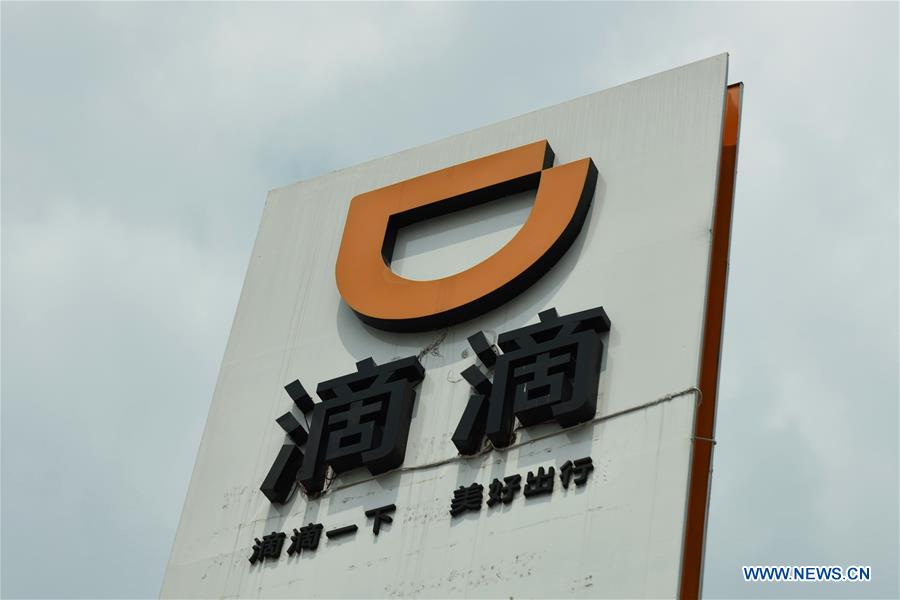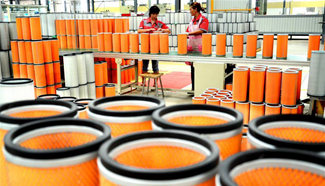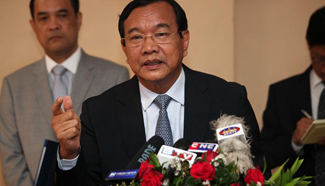
Photo taken on Aug. 1, 2016 shows a symbol of Didi in Hangzhou, capital of east China's Zhejiang Province. Chinese on-demand mobility (ODM) firm Didi announced Monday it will take over Uber's China business, in a deal that could value the merged China operation at 35 billion U.S. dollars. (Xinhua/Long Wei)
BEIJING, Aug. 2 (Xinhua) -- Chinese on-demand mobility (ODM) firm Didi's takeover of the business of Uber China has triggered worries over potential monopoly and price hikes.
Didi announced Monday it was taking over Uber China, in a deal that could value the merged operations in China at 35 billion U.S. dollars.
Uber will take a 5.9 percent stake in Didi, which in turn did not disclose the stake it will take in Uber. Uber China's ODM service will continue to operate independently.
The deal follows China's recent legalization of ODM services.
Yang Jianhua, head of the Public Policy Research Institute of the Zhejiang Academy of Social Sciences, described the merger as "unexpected but reasonable."
"If the two companies continued to wage war against each other via discounts, both would be hurt," Yang said.
The takeover, however, has fueled concerns from experts that a monopoly might hurt the market.
The deal is not subject to anti-monopoly review by the State Council as both have not made profits and Uber China's revenue did not reach the review threshold, Didi said.
However, the takeover would in fact create a monopoly as the two might have more than 90 percent of the market share in China, said Wu Weiqiang, vice president of the Hangzhou Institute for Reform and Development.
Monopoly could reduce competition and result in higher prices for more profits, said Zhou Hanhua, a researcher with the Chinese Academy of Social Sciences.
Passengers and drivers are also worried that they will lose benefits following the deal.
"I am worried about fewer discounts and higher fees," said Wang Rong, a 27-year-old resident of Hangzhou, capital of east China's Zhejiang Province.
"I hope my salary will not decrease in the future," said Shen Yangfei, a Hangzhou driver.
Ye Yun, a public relations representative for Didi, told Xinhua that discounts for passengers and drivers will continue "for a long time."
"On-demand taxi-hailing services have just started in China," said Yang Jianhua. "There is very high potential in many aspects of this business."
The two companies have been locked in a bitter battle for customers in China marked by huge discounts since last year. Didi has strong capital support, while Uber has unique data processing technology and capital operations.
Uber is one of a few foreign tech firms that has been able to compete with domestic rivals head-on in China. While Didi has the majority of China's ODM services, Uber has managed to establish a foothold and made inroads in lower-tier cities this year.
The competition prompted a discount war. In June, Didi announced it had secured 7.3 billion U.S. dollars in equity and debt financing, including 1 billion dollars from Apple, which valued the company at around 28 billion dollars.
Uber secured over 6 billion dollars in its latest funding round. Liu Zhen, Uber's China head of strategy, said in June that most of the money would fund operations in China.
While Uber has generated over 1 billion dollars in profit from its top 30 cities worldwide, the company has not yet made profit in any Chinese city, even though it provides more trips in China than any other country.











